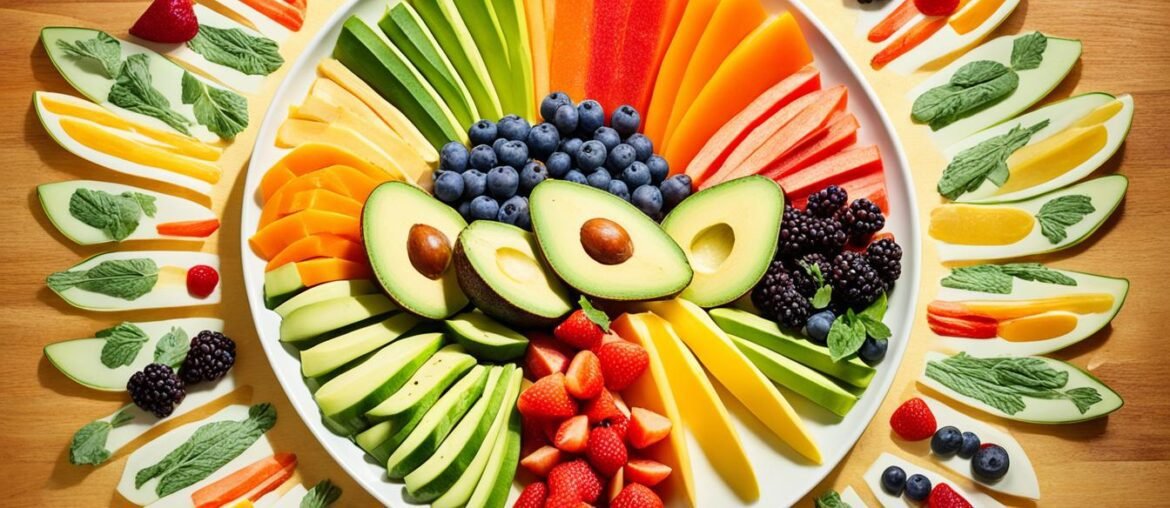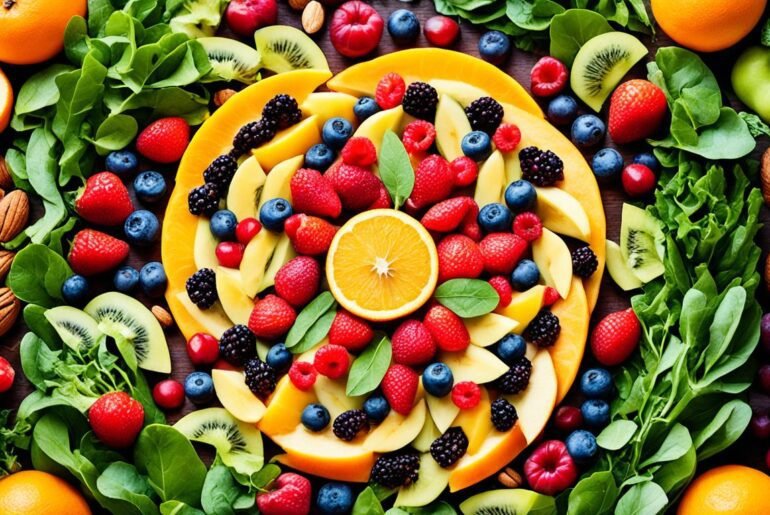Did you know that the food you eat can directly impact the health and vitality of your skin? It’s true! The nutrients you consume play a crucial role in skin rejuvenation, helping to nourish your body from within and unlock a radiant, youthful complexion.
Investing in a healthy skin diet can have transformative effects, providing your skin with the essential nutrients it needs to thrive. From anti-aging superfoods to collagen-boosting snacks, there is a wide range of delicious options that can support your skin health and help you achieve that coveted youthful glow.
In this article, I will delve into the best nutrition for skin rejuvenation, sharing valuable insights on how certain foods can nourish your skin, combat aging, and promote radiance. Get ready to discover the power of skincare nutrition tips and unleash the potential of a nourishing diet for your skin.
Key Takeaways:
- Eating the right foods can profoundly impact the health and appearance of your skin.
- A healthy skin diet can nourish your body from within and contribute to a radiant complexion.
- Choosing foods that are rich in antioxidants, vitamins, and essential nutrients is crucial for skin rejuvenation.
- Incorporating a variety of colorful fruits, vegetables, nuts, and superfoods can promote youthful-looking skin.
Broccoli: An Anti-Inflammatory Powerhouse for Skin Health
When it comes to promoting skin health, broccoli is an undeniable powerhouse. This nutrient-rich vegetable contains a wealth of essential vitamins and minerals that can help rejuvenate your skin and combat the signs of aging.
Broccoli is packed with vitamin C, a key nutrient for collagen production. Collagen plays a crucial role in maintaining the elasticity and firmness of your skin, making it an essential component for a youthful complexion. By incorporating broccoli into your diet, you can support your body’s natural collagen production and promote healthier, more resilient skin.
In addition to vitamin C, broccoli is also rich in vitamin K, which is known for its role in promoting bone health. Calcium, another vital mineral found in broccoli, is essential for maintaining strong and healthy bones, which indirectly contributes to maintaining healthy skin.
But that’s not all – broccoli also contains lutein, a powerful antioxidant that protects your skin against oxidative stress and may help prevent the appearance of wrinkles and fine lines. Moreover, the fiber and folate content of broccoli aids in digestion and supports overall health, which can contribute to improved skin health as well.
| Nutrients in Broccoli | Benefits for Skin Health |
|---|---|
| Vitamin C | Promotes collagen production for youthful skin |
| Vitamin K and Calcium | Contribute to bone health, indirectly supporting skin health |
| Lutein | Protects against oxidative stress and may help prevent wrinkles |
| Fiber and Folate | Aids in digestion and supports overall health |
Adding broccoli to your diet can be a simple yet effective way to nourish your skin from within. Whether steamed, roasted, or incorporated into salads and stir-fries, this versatile vegetable offers a wide range of health benefits for your skin and overall well-being.
Notable Quote:
“Broccoli is truly a nutritional powerhouse, offering an impressive array of vitamins, minerals, and antioxidants that promote collagen production, support bone health, and protect against oxidative stress. Including this green gem in your diet can help you achieve radiant, youthful-looking skin.” – Dr. Samantha Evans, Dermatologist
Red Bell Pepper: An Antioxidant-Rich Veggie for Aging Well
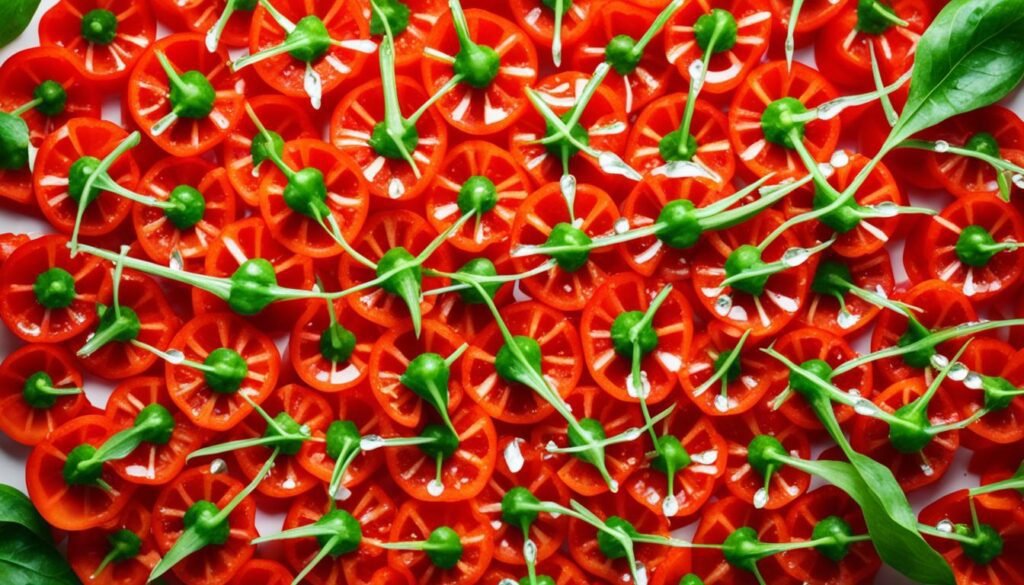
When it comes to nourishing your body and promoting a youthful complexion, red bell peppers are an excellent addition to your diet. These vibrant and flavorful veggies are not only delicious but also packed with antioxidants that can support your overall health and skin wellness.
Antioxidants play a crucial role in protecting your body from harmful free radicals that can contribute to aging and various health conditions. Red bell peppers are particularly rich in vitamin C and carotenoids, which are powerful antioxidants with numerous benefits.
- Vitamin C: Red bell peppers are an excellent source of vitamin C, providing more than 100% of the recommended daily intake in just one medium-sized pepper. This vitamin is essential for collagen production, a protein that helps keep your skin firm and elastic. It also acts as an antioxidant, helping to protect your skin from damage caused by environmental stressors such as pollution and UV rays.
- Carotenoids: These pigments give red bell peppers their vibrant color and are known for their antioxidant properties. Carotenoids, such as beta-carotene and lycopene, can help reduce inflammation in the body, which is essential for maintaining healthy and youthful-looking skin. In addition to their anti-inflammatory properties, carotenoids also have a protective effect against sun damage, helping to prevent skin aging and promoting a radiant complexion.
Incorporating red bell peppers into your diet is easy and can be done in various ways. Enjoy them raw as a crunchy and refreshing snack, add them to salads for an extra burst of flavor and nutrition, or include them in stir-fries, soups, or roasted vegetable medleys.
To give you an idea of the nutritional composition of red bell peppers, here is an overview:
| Nutrient | Amount per 1 medium-sized pepper (approx. 119g) |
|---|---|
| Calories | 39 |
| Carbohydrates | 9 grams |
| Fiber | 3 grams |
| Vitamin C | 152% of the recommended daily intake |
| Carotenoids (including beta-carotene and lycopene) | High content |
| Vitamin B6 | 10% of the recommended daily intake |
| Folate | 10% of the recommended daily intake |
| Potassium | 8% of the recommended daily intake |
| Vitamin E | 8% of the recommended daily intake |
By incorporating red bell peppers into your diet, you can benefit from their antioxidant-rich properties, reap the rewards of vitamin C and carotenoids, and support your overall health and skin wellness. Remember to consume a variety of colorful fruits and vegetables to ensure a well-rounded and nourishing diet for optimal aging well.
Spinach: A Hydrating Leafy Green for Skin Health
Incorporating spinach into your diet can have multiple benefits for your skin health. Spinach is not only a delicious and versatile ingredient but also a nutritional powerhouse that provides numerous vitamins and minerals essential for maintaining healthy skin.
Spinach is remarkably hydrating, making it an excellent choice for promoting skin hydration from within. Its high water content helps to keep your skin moisturized, giving it a natural glow.
But that’s not all! Spinach is also packed with antioxidants that protect your skin from damage caused by free radicals. These antioxidants, combined with the vitamins and minerals found in spinach, work together to support optimal skin health.
One of the key nutrients found in spinach is vitamin A, which plays a crucial role in promoting collagen production. Collagen is a protein that gives your skin its structure and elasticity, helping to maintain a youthful appearance.
Spinach is also rich in vitamins C, E, and K, which are all essential for healthy skin. Vitamin C, a powerful antioxidant, helps brighten the skin and reduce the appearance of dark spots, while vitamin E protects your skin from oxidative stress and damage caused by the sun’s harmful UV rays. Vitamin K, on the other hand, aids in blood clotting and may help reduce the appearance of dark under-eye circles.
Additionally, spinach contains lutein, a carotenoid that promotes eye health and protects the skin from harmful UV rays. Lutein acts as a natural sunscreen, helping to prevent sunburn and skin damage caused by prolonged sun exposure.
Moreover, studies have shown that spinach may have anti-cancer properties, particularly in preventing certain types of cancers, including those affecting the skin. Its high content of various vitamins, minerals, and antioxidants contributes to its cancer-fighting potential.
To harness the benefits of spinach for your skin, try incorporating it into your daily diet. You can enjoy spinach in salads, smoothies, soups, or even sautéed as a flavorful side dish. The possibilities are endless!
Benefits of Spinach for Skin Health:
- Hydrates and moisturizes the skin
- Provides antioxidants for skin protection
- Promotes collagen production for youthful skin
- Brightens the skin and reduces dark spots
- Protects against sun damage and UV rays
- Promotes eye health
- Potential for cancer prevention
Incorporating spinach into your diet not only adds a burst of flavor to your meals but also provides your skin with the vital nutrients it needs for a healthy and radiant appearance. So why not start including this hydrating leafy green in your daily meals and reap the many benefits it offers for your skin health?
Sweet Potatoes: Promoting Skin Elasticity with Beta-Carotene

To maintain youthful-looking skin and promote skin elasticity, incorporating sweet potatoes into your diet can be highly beneficial. Sweet potatoes are rich in beta-carotene, which is converted to vitamin A in the body. Vitamin A plays a crucial role in promoting skin cell turnover and maintaining the elasticity of the skin.
In addition to beta-carotene, sweet potatoes also contain vitamins C and E, which are known for their antioxidant properties. These vitamins help protect the skin from oxidative damage and promote its overall health. Vitamin C aids in collagen synthesis, a protein essential for skin structure and firmness. Meanwhile, vitamin E acts as a moisturizer, nourishing and restoring the skin’s elasticity.
Incorporating sweet potatoes into your meals allows you to reap the benefits of these skin-loving nutrients. Whether mashed, roasted, or as a base for tasty soups, sweet potatoes provide a delicious and nutritious addition to your diet.
If you’re looking for a tasty and healthy recipe using sweet potatoes, try this sweet potato and chickpea curry. It’s a flavorful way to enjoy the skin-enhancing benefits of sweet potatoes.
Benefits of Sweet Potatoes for the Skin:
- Promotes skin elasticity and cell turnover
- Protects the skin from oxidative damage
- Aids in collagen synthesis
- Restores skin’s elasticity
Recipe: Sweet Potato and Chickpea Curry
| Ingredients | Instructions |
|---|---|
|
|
Enjoy the delicious flavors of this sweet potato and chickpea curry while nourishing your skin with the skin-boosting benefits of sweet potatoes.
Watercress: Nutrient-Dense Green for Skin Health
Watercress is a nutrient-dense leafy green that offers a multitude of health benefits for your skin and overall well-being. It is packed with essential vitamins and minerals that promote glowing skin and support various bodily functions.
One of the key advantages of watercress is its ability to boost the immune system. With its high concentration of vitamin C, watercress helps strengthen your body’s defense against illness and infection.
Additionally, this leafy green is rich in vitamins A, K, B1, and B2, as well as calcium and potassium. These nutrients are crucial for maintaining healthy skin, improving eye health, and supporting heart health.
Watercress is also known for its antioxidant properties, which help protect your skin from damage caused by environmental factors such as pollution and UV radiation. These antioxidants aid in reducing inflammation and preventing signs of premature aging.
To highlight the benefits of watercress, here is a breakdown of its key nutrients:
| Nutrient | Benefits |
|---|---|
| Vitamin A | Promotes healthy skin cell turnover and supports eye health |
| Vitamin C | Boosts collagen production, aids in wound healing, and strengthens the immune system |
| Vitamin K | Improves blood circulation and contributes to overall skin health |
| Vitamin B1 | Supports energy production and promotes healthy hair and nails |
| Vitamin B2 | Helps maintain healthy skin and supports the body’s natural antioxidant defenses |
| Calcium | Strengthens bones and teeth, and plays a role in skin cell regeneration |
| Potassium | Regulates hydration levels, ensuring radiant and moisturized skin |
Including watercress in your diet is a simple and delicious way to nourish your body, support your immune system, and promote skin health. Add it to your salads, sandwiches, or smoothies to benefit from its nutrient density and reap the rewards of a radiant complexion.
Remember, when it comes to achieving optimal skin health, what you put inside your body is just as important as what you apply topically. By incorporating nutrient-dense foods like watercress into your diet, you can nourish your skin from within and enjoy the benefits of a healthy, glowing complexion.
Avocado: Inflammation-Fighting Superfood for Skin Health
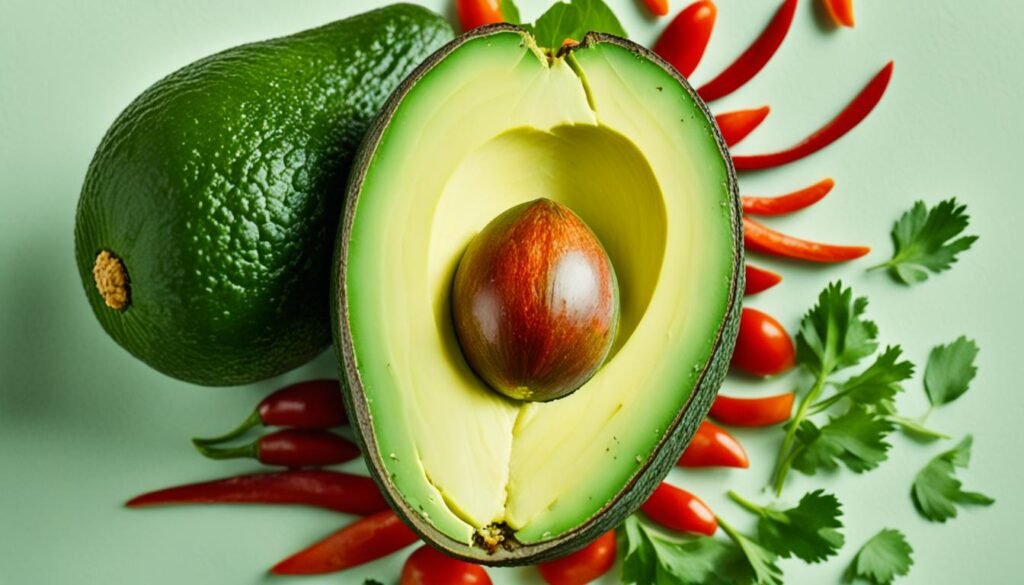
Avocados are a powerhouse when it comes to skin health. Not only are they delicious, but they also offer a wide range of benefits for your skin and overall well-being.
One of the key properties of avocados is their ability to fight inflammation. Inflammation in the body can lead to various skin problems such as acne, redness, and premature aging. The high content of healthy fats in avocados, including omega-3 fatty acids, helps combat inflammation and keep your skin looking healthy and radiant.
But avocados don’t stop there. They are also packed with essential nutrients that promote enhanced skin health. Avocados are rich in vitamins K, C, E, and A, all of which play a crucial role in maintaining the health and appearance of your skin.
| Nutrient | Benefits |
|---|---|
| Vitamin K | Helps reduce dark circles and under-eye bags |
| Vitamin C | Supports collagen production and brightens the skin |
| Vitamin E | Protects against free radicals and promotes skin healing |
| Vitamin A | Stimulates cell turnover and improves skin texture |
In addition to these essential nutrients, avocados are also a great source of potassium. This mineral helps maintain the balance of fluids in your body, keeping your skin hydrated and preventing dryness.
Research suggests that incorporating avocados into your daily diet can have a significant impact on your skin health. Their anti-inflammatory properties and abundance of essential nutrients make them an excellent addition to any skincare routine.
“Avocado is a true superfood for the skin. Its inflammation-fighting properties and rich nutrient content make it a powerful ally in maintaining healthy, glowing skin.” – Dr. Amanda Johnson, Dermatologist
So, whether you enjoy avocados in salads, smoothies, or as a topping on toast, make sure to include them in your diet regularly. Your skin will thank you for it.
Blueberries: Antioxidant-Rich Fruit for Skin Protection
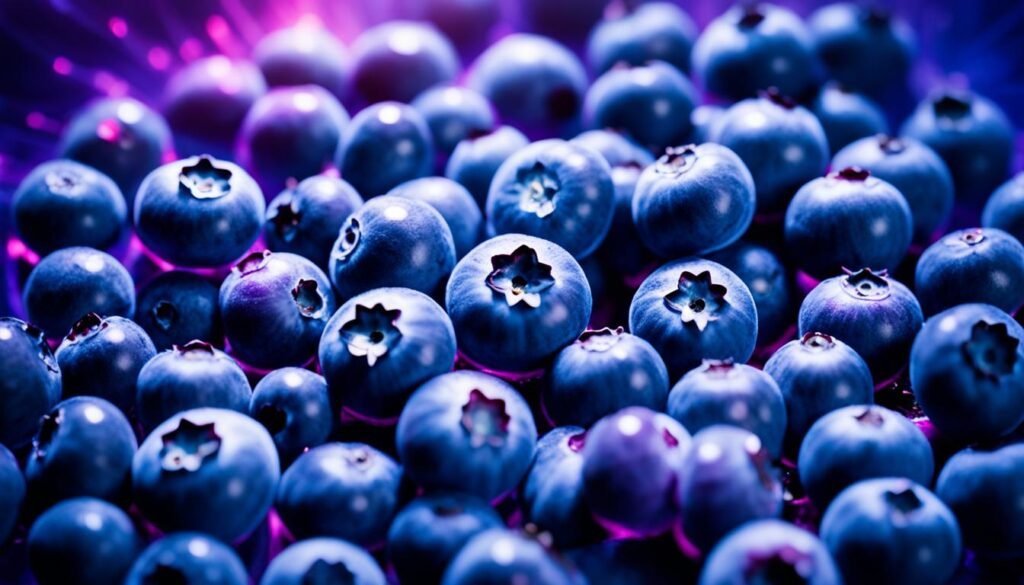
When it comes to protecting your skin from external damage, blueberries are a true powerhouse. These tiny fruits are packed with antioxidants, including vitamins A and C, that work together to shield your skin from harmful free radicals and reduce the loss of collagen, an essential protein that keeps your skin firm and youthful.
Incorporating blueberries into your daily diet can provide your skin with the protective nutrients it needs to maintain its health and radiance. The antioxidant properties of blueberries help fight against the damaging effects of sun exposure, helping to prevent premature aging and maintaining a youthful appearance.
But that’s not all. Blueberries also contain vitamins A and C, which are known for their skin-nourishing benefits. Vitamin A helps promote cell turnover, helping your skin regenerate and maintain its elasticity, while vitamin C contributes to collagen production, improving the overall texture and tone of your skin.
To reap the benefits of blueberries for your skin, try incorporating them into your breakfast bowl, adding them to smoothies, or enjoying them as a healthy snack. Whether fresh or frozen, blueberries can be a delicious and nutritious addition to your skincare routine.
| Nutrient | Amount per 1 cup (148g) |
|---|---|
| Vitamin A | 80 International Units (IU) |
| Vitamin C | 14.4 milligrams (mg) |
| Antioxidants | Various types |
| Fiber | 3.6 grams (g) |
| Calories | 84 |
“Blueberries are a delicious way to protect your skin from oxidative stress and reduce collagen loss. Plus, their natural sweetness makes them a guilt-free treat.”
Blueberry Recipes for Healthy, Glowing Skin
- Blueberry smoothie bowl: Blend frozen blueberries, a banana, almond milk, and your favorite toppings like granola and coconut flakes.
- Blueberry and spinach salad: Toss together baby spinach, blueberries, feta cheese, walnuts, and a tangy vinaigrette for a nutrient-packed lunch.
- Blueberry overnight oats: Combine rolled oats, almond milk, chia seeds, and blueberries in a jar. Let it sit overnight for a quick and nutritious breakfast.
With their antioxidant-rich properties and skin-protective benefits, blueberries are a must-have fruit for anyone seeking healthy, glowing skin. Start incorporating this superfood into your diet and enjoy the many benefits it offers.
Papaya: Superfood for Anti-Aging and Skin Health
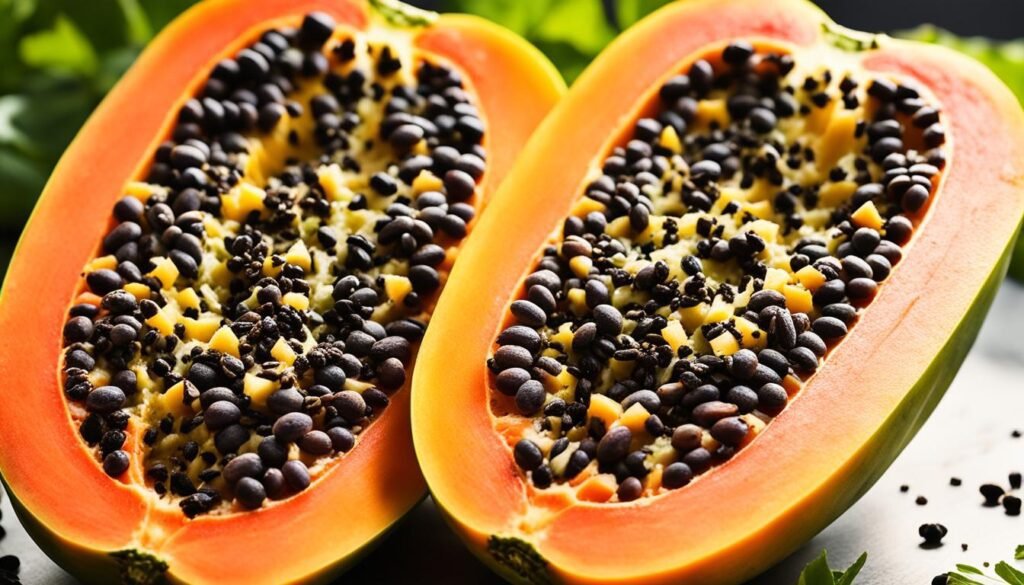
Papaya is a superfood that offers a range of health benefits and plays a crucial role in promoting anti-aging effects on the skin. This antioxidant-rich fruit is packed with vitamins A, C, K, and E, as well as essential minerals like calcium, potassium, and magnesium.
Papaya’s antioxidant properties help protect the skin from damage caused by free radicals, reducing the signs of aging and promoting a youthful complexion. The high vitamin content, especially vitamins A, C, and E, nourishes the skin and supports collagen production, improving its elasticity and firmness.
Moreover, papaya is known for its anti-tumor effects, thanks to the presence of compounds like lycopene and beta-carotene. These compounds help in preventing the growth and spread of cancer cells, making papaya a valuable addition to a healthy diet.
In addition to its anti-aging properties, papaya is also beneficial for improving digestion. This tropical fruit contains enzymes like papain, which aid in breaking down proteins and facilitating proper digestion, preventing digestive disorders and promoting overall gut health.
Papaya’s abundance of vitamins and minerals also helps prevent age-related diseases by boosting the immune system and providing vital support for overall health.
Including papaya in your diet can support graceful aging, enhance skin health, improve digestion, and prevent age-related diseases. The versatile nature of papaya makes it easy to incorporate into your daily routine, whether enjoyed as a standalone fruit or added to smoothies, salads, or desserts.
Discover the incredible benefits of papaya and unlock its potential for anti-aging and skin health. Indulge in this delicious fruit and harness the power of its antioxidant-rich profile to nourish your skin from within.
Nuts: Collagen-Boosting Snacks for Skin Health
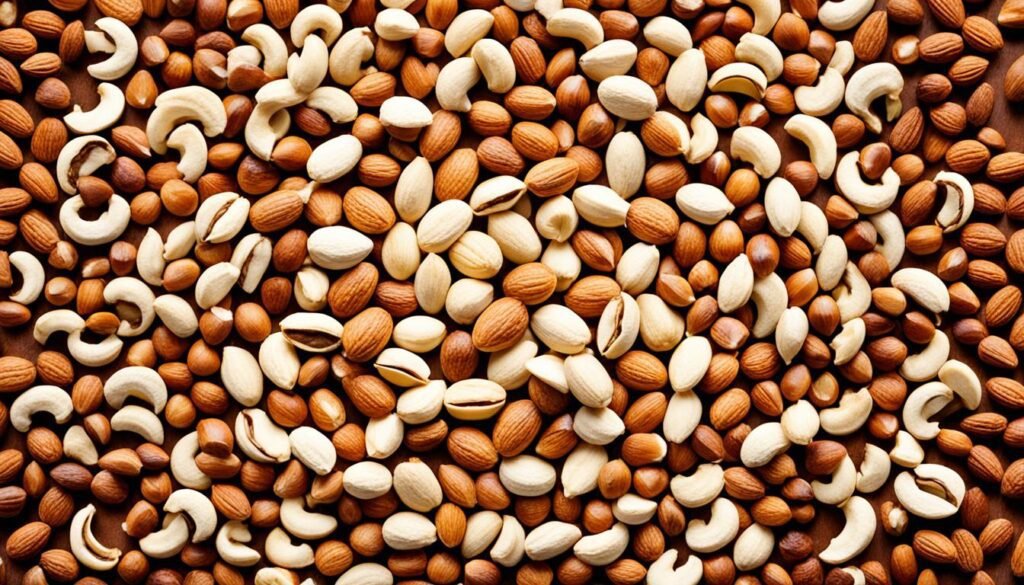
When it comes to maintaining healthy skin, nuts are a delicious and nutritious choice. These crunchy snacks are not only packed with flavor but also offer a range of benefits for your skin.
One of the key nutrients found in nuts, especially almonds, is vitamin E. Vitamin E is known for its collagen-boosting properties, which help repair skin tissue, retain moisture, and protect against UV rays. By consuming nuts regularly, you can promote collagen production, which is vital for maintaining the elasticity and firmness of your skin.
But the benefits of nuts don’t stop there. Different types of nuts offer various health benefits, such as reducing the risk of type 2 diabetes and improving heart health. Including a mix of nuts in your diet can provide additional vitamins, minerals, and healthy fats that support overall skin health.
Here are some popular nuts that you can incorporate into your daily routine:
- Almonds: Rich in vitamin E and antioxidants, almonds are great for repairing skin and protecting against free radicals.
- Walnuts: Packed with omega-3 fatty acids, walnuts help improve skin elasticity and reduce inflammation.
- Brazil nuts: These nuts are an excellent source of selenium, which plays a crucial role in protecting the skin from sun damage.
- Cashews: With high levels of zinc, cashews aid in the production of collagen and promote a healthy complexion.
- Pistachios: Loaded with antioxidants, pistachios can protect against skin damage caused by aging and sun exposure.
So whether you sprinkle them on top of your salad, enjoy them as a snack, or blend them into a smoothie, incorporating a variety of nuts into your diet can provide your skin with the essential nutrients it needs to stay healthy and radiant.
Don’t forget to consult with a healthcare professional or nutritionist to determine the right portion sizes and ensure that nuts fit into your overall dietary plan.
Pomegranate: Wrinkle-Preventing Superfruit for Skin Health
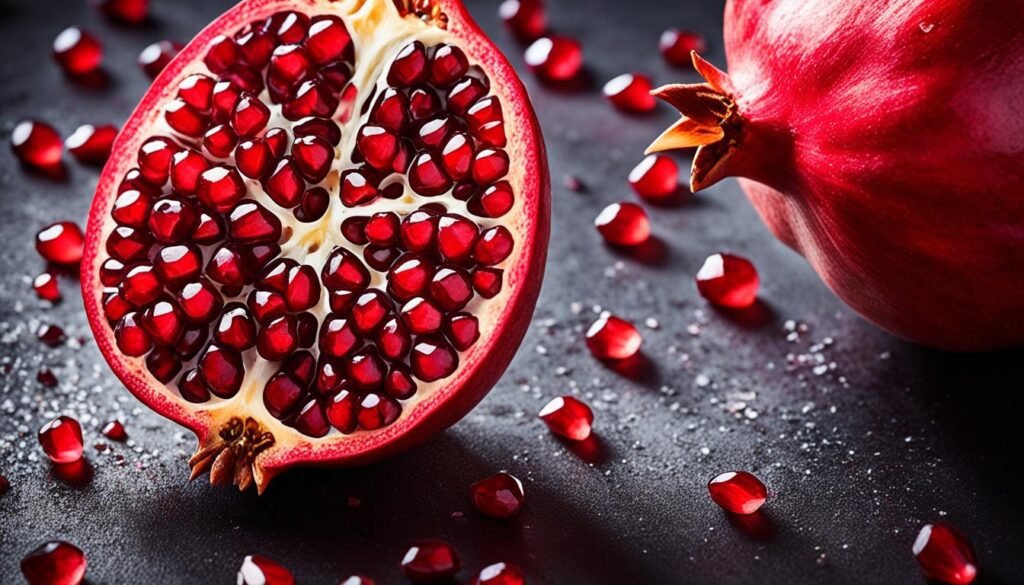
When it comes to maintaining youthful-looking skin, pomegranates are a powerful ally. These vibrant fruits are packed with a compound called ellagic acid, which naturally helps prevent wrinkles and promotes skin health in multiple ways.
One of the key benefits of pomegranates is their ability to protect collagen, the protein responsible for maintaining skin’s firmness and elasticity. Collagen breakdown is a natural part of the aging process, but factors such as UV exposure can accelerate this process. The ellagic acid found in pomegranates acts as a shield, preventing collagen degradation and keeping your skin looking plump and youthful for longer.
Pomegranates also offer protection against UV-induced inflammation. Exposure to the sun’s harmful UV rays can lead to skin damage and inflammation, which contribute to premature aging and wrinkles. The ellagic acid in pomegranates has anti-inflammatory properties, reducing the impact of UV-induced inflammation and helping to maintain healthier, more resilient skin.
Including pomegranates in your diet can have a significant impact on your skin’s overall health and appearance. From wrinkle prevention to collagen protection and inflammation reduction, this superfruit offers an array of benefits for maintaining youthful, radiant skin.
Conclusion
After exploring the power of nutrition for skin rejuvenation, it is clear that what we eat plays a crucial role in maintaining healthy, youthful-looking skin. By incorporating a variety of fruits, vegetables, nuts, and superfoods into our diet, we can provide our body with the essential nutrients it needs to support skin health and promote a radiant complexion.
Opting for antioxidant-rich foods like blueberries and pomegranates helps protect the skin from damage caused by free radicals and reduce collagen loss. Including leafy greens such as spinach and watercress provides hydrating properties and a wide range of vitamins and minerals essential for skin nourishment. Adding broccoli and red bell peppers to our plate ensures an anti-inflammatory boost for skin health.
To achieve optimal skin rejuvenation, it’s important to remember to eat a colorful array of foods. Each vibrant hue represents a unique combination of vitamins, minerals, and antioxidants that work together to promote overall skin health. By nourishing our bodies with the best nutrition for skin rejuvenation, we can unlock the secret to a resilient, youthful complexion that radiates from within.
FAQ
What is the best nutrition for skin rejuvenation?
The best nutrition for skin rejuvenation includes foods that are high in antioxidants, healthy fats, and essential nutrients. These include fruits, vegetables, nuts, and superfoods that promote collagen production, protect against aging, and support overall skin health.
How can nutrition support skin health?
Nutrition plays a crucial role in supporting skin health by providing essential nutrients that promote collagen production, protect against skin aging, and improve overall skin health. Eating a balanced diet rich in vitamins, minerals, and antioxidants can nourish the skin from within and promote a youthful complexion.
Which foods are good for nourishing the skin from within?
Foods that are good for nourishing the skin from within include broccoli, red bell peppers, spinach, sweet potatoes, watercress, avocados, blueberries, papaya, nuts, and pomegranates. These foods are packed with antioxidants, vitamins, and minerals that promote collagen production, protect against skin aging, and support overall skin health.
Can nutrition help prevent wrinkles and promote youthful-looking skin?
Yes, nutrition can help prevent wrinkles and promote youthful-looking skin. Certain foods, such as blueberries, pomegranates, and nuts, contain antioxidants that protect the skin from sun damage and reduce collagen loss, leading to fewer wrinkles and a more youthful complexion.
How can I incorporate these skin-nourishing foods into my diet?
You can incorporate skin-nourishing foods into your diet by adding them to your meals and snacks. For example, you can include broccoli in stir-fries or salads, enjoy red bell peppers as a snack or in a stir-fry, add spinach to smoothies or omelets, bake sweet potatoes as a side dish, include watercress in salads or sandwiches, spread avocado on toast or use it as a topping for salads, enjoy blueberries as a snack or in yogurt, eat papaya as a tropical fruit salad or in smoothies, mix nuts into your trail mix or sprinkle them on salads, and enjoy pomegranate seeds as a topping for yogurt or in salads.
Are there any other benefits of eating these skin-nourishing foods?
Yes, these skin-nourishing foods offer numerous other health benefits. For example, broccoli supports brain function and bone health, red bell peppers have anti-inflammatory properties and benefit overall health, spinach supports eye health and cancer prevention, sweet potatoes promote skin elasticity, watercress supports the immune system and aids digestion, avocados have inflammation-fighting properties, blueberries protect against collagen loss, papaya has anti-tumor effects and improves digestion, nuts reduce the risk of type 2 diabetes and improve heart health, and pomegranates help prevent wrinkles and protect collagen.
Can eating these foods alone guarantee healthy and youthful skin?
Eating a diet rich in skin-nourishing foods is an important step towards healthy and youthful skin, but it’s not the only factor. Other lifestyle factors such as proper skincare, hydration, sun protection, and stress management also play a significant role in maintaining skin health. It’s important to adopt a holistic approach to skincare and overall well-being.

